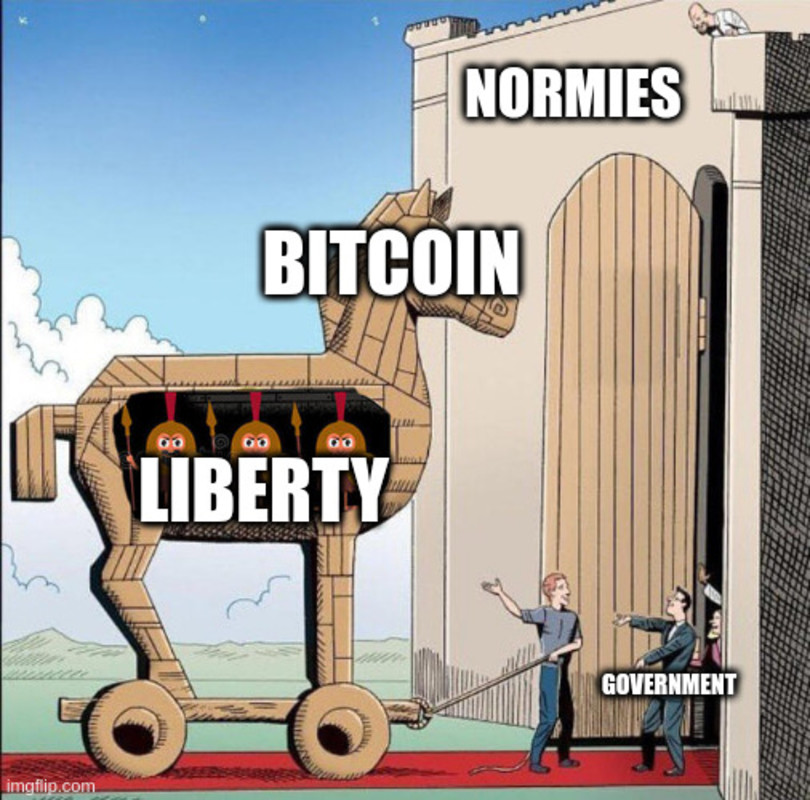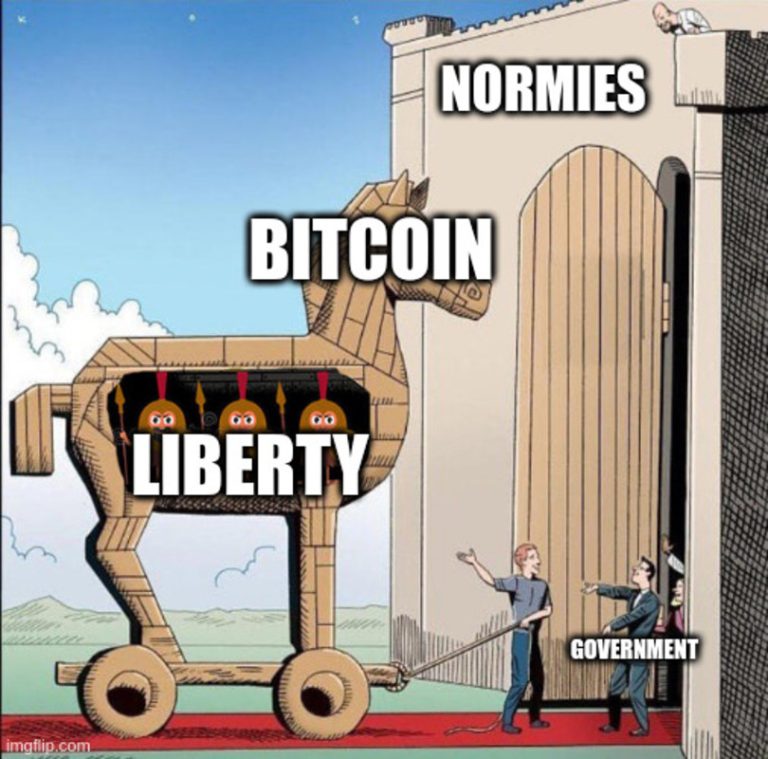Since its inception more than 15 years ago, Bitcoin has captured the imagination of libertarians, anarchists, and a variety of other advocates of individual freedom and financial sovereignty. For them, Bitcoin represents a revolutionary challenge to money and state-controlled power. As such, it has come to symbolize the disruptive shift toward greater freedom and autonomy for individuals in modern society.
However, as Bitcoin gains mainstream momentum, there are more and more signs that it may be abandoning its revolutionary roots. The explosive growth in the number of users and market value has corresponded with a dilution of the freedom-oriented spirit that initially defined the technology. In a hyper-Bitcoin future world, will Bitcoin still embody the libertarian ideals that generated so much excitement among its early followers? Or will it become just another compatible financial asset to be absorbed into the existing global monetary system?
This question goes beyond philosophical debates about crypto anarchy and speaks to the concrete decisions that developers, miners, and users will face in Bitcoin's next decade. There are difficult trade-offs between the cypherpunk vision of complete financial freedom and the necessary compromises for future scalability. Navigating these choices will determine whether Bitcoin realizes its disruptive potential or succumbs to the governmental forces it originally sought to circumvent.
In contemporary society, adopting a libertarian mindset is often considered radical in contrast to permissible mainstream opinion—a perspective recognized by many within the libertarian community. The prevailing challenge lies in the prevailing acceptance of the myth of the state, an entrenched belief system that advocates of freedom conscientiously confront. Despite the enormous nature of this challenge, many liberals remain committed to advancing freedom through diverse and strategic initiatives. Their collective efforts aim not only to challenge the status quo, but also to profoundly transform societal attitudes toward freedom.
The struggle against mainstream acceptance of state centralization is an ongoing journey, and as dedicated advocates, they recognize the need for a multi-faceted approach. From engaging in public discourse to promoting educational initiatives, their endeavors are rooted in the conviction that the principles of freedom are essential to a thriving society. This commitment extends beyond ideological boundaries, to include a shared vision of a future in which individual freedoms are valued and supported.
As an advocate for freedom, the discovery of Bitcoin was a pivotal moment for me. As I began my journey down the rabbit hole, I couldn't help but feel delightfully excited about the project. This crypto protocol offered a cunning, devious way to separate money from the state, providing a new practical way to promote freedom in our lives. Bitcoin embodied the principles of individual sovereignty and financial independence. It has become a beacon for those looking for alternatives to the state's coercive central systems.

The concept encapsulated in the meme “Bitcoin is a Trojan horse for freedom” resonated deeply. It suggests that individuals, previously indifferent to principles of freedom, may unwittingly adopt them as they seek personal financial gain through Bitcoin. The idea that “number-rising” technology is, in essence, a secret “liberty-rising technology” underscores the transformative potential of Bitcoin within the broader context of promoting individual freedoms and challenging traditional power structures. This aspect added another layer of importance to my appreciation of Bitcoin's role as a revolutionary force within the broader freedom movement.
Bitcoin has proven its ability to empower individuals to bypass authoritarian regimes. Organizations such as the Human Rights Foundation and the Oslo Freedom Forum have effectively highlighted personal stories of how Bitcoin has positively transformed lives around the world. It has provided people with the ability to engage in transactions using currency without the disgrace of government and censorship. This sentiment resonates within the Bitcoin community today, and is expressed through slogans such as “Not your keys, not your coins,” “Be your own bank,” and “We separate money from the state!” There is a wealth of educational content dedicated to reinforcing these principles and emphasizing the increased freedom that comes with monetary sovereignty.
Additionally, Bitcoin promotes individual freedom by allowing individuals who can save to store their value in savings technology that is not subject to a government fiat money Ponzi scheme. Individuals can exchange for a currency that the government cannot censor, providing a safe and censorship-resistant means of financial transactions. While these accomplishments are noteworthy and worthy of appreciation, there is an uncomfortable truth that often remains undiscussed or even ignored – the challenge of increasing the number of sovereign users on the network.
As you delve deeper into the world of Bitcoin, you will gradually adopt a more technical perspective. While some find this understanding intuitive, others may face challenges. However, you will eventually face the reality of blockchain technology's scalability. Due to block size restrictions, there is a limit to the transaction throughput of each new block. The agreed solution adopted by the network was a multi-layered scaling approach. Enter Accelerator Network, a layer 2 solution designed to enhance the economic density of cross-chain transactions. It enables two parties to participate in a multi-signature channel, facilitating multiple payments for each of the few transactions required on the chain, including opening, linking and closing channels. Despite issues like liquidity management and online requirements, this engineering marvel expands the network's transaction processing capabilities dramatically, almost without limits. The only problem: Guardians will be necessary for the majority of users.
Despite the current implementation of the Lightning Network, there are still limitations on the number of sovereign users the network can accommodate. Despite improvements in payment scaling, the Bitcoin network can only support 10 to 100 million sovereign users who update express channels several times a year – whether they are individuals, individual custodians, or federal custodians implementing eCash systems. In a hyper-Bitcoin world of over 8 billion people, the implications are easy to understand. The uncomfortable truth is that less than one percent of the world's population will have the ability to use Bitcoin in a sovereign manner.
Achieving sovereignty with Bitcoin requires exclusive control of the UTXO. Scaling the number of sovereign users on the network requires additional engineering efforts and consensus changes. It is necessary to create mechanisms that reduce trust for users to share UTXO and handle disputes over partial UTXO ownership without imposing excessive economic costs for resolution. There is currently an ongoing discussion within the development community about how enacting charters can begin to address these issues, and in particular how CTV can help scale Bitcoin as an initial building block for solutions to these sovereignty scaling problems.
The seriousness and urgency of this issue depends on the extent of your true appreciation for the principle of separating money from the state. We find ourselves at a pivotal juncture, as we consider the trajectory and importance of what a world fully immersed in super-currencies truly entails. Without intervention, we could find ourselves in a future where 99% of the population requires some form of guardianship to navigate the complexities of the Bitcoin network.
This potential scenario raises legitimate concerns about the possibility of the state exercising control over the network in the future. The issue of urgency becomes paramount. Although I refrain from advocating reckless behavior and hasty implementation, there is a clear sense that the metaphorical window of opportunity is narrowing.
Reflecting on the history of Bitcoin, it becomes clear that enabling consensus changes on the network becomes progressively more difficult as it expands. Network growth brings complexity, making it more difficult to convince the vast majority to adopt a protocol upgrade unless there is massive demand for such a change. This nuanced insight highlights the need to carefully and quickly consider the dynamics of the evolving Bitcoin ecosystem.
My concern revolves around the urgent need for a majority of participants to truly value individual freedom, recognize its importance in implementing important improvements and addressing prevailing problems of expansion. Having ventured into the world of Bitcoin from a libertarian point of view, I am painfully aware of the lack of respect for freedom that prevails among the majority in society. There is a real fear that Bitcoin, initially a cornerstone of the freedom movement, may gradually lose its essence and devolve into just another financial asset – first gradually, then suddenly.
Facing the present reality requires a practical perspective, and recognizing it for what it is rather than wishful thinking. To those who share the weight of my concerns, I implore you to remain steadfast and steadfast in your commitment to championing individual liberty. Embrace, with real conviction, the pivotal role that Bitcoin plays in furthering this cause. The road ahead is enormous, and requires a united effort closely linked to our collective purpose. Let us address the challenge of expanding sovereignty honestly, with full awareness of the critical work that lies ahead. Each of us has a unique and indispensable role in this organic endeavor – let us embrace it with true strength and unwavering determination.
This is a guest post by Michael Matuliffe. The opinions expressed are entirely their own and do not necessarily reflect the opinions of BTC Inc or Bitcoin Magazine.

